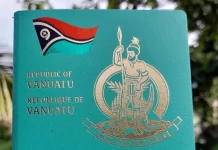First 100 percent sustainable tuna fishery celebrates 25 years of Western and Central Pacific fisheries partnerships on World Tuna Day
Over the past 25 years, successful Pacific Ocean fisheries partnerships supported the world’s largest tuna fishery—nearly 60 per cent of global tuna catch—to transform from a potentially unsustainable fishery to one of the most effectively managed large-scale fisheries in the world.
The story of the partnership’s success is celebrated on World Tuna Day today (2 May 2022) with the launch of an 45 page e-booklet, which tells how the partners worked with Pacific Island nations to ensure sustainable tuna stocks into the foreseeable future.
Coordinator of the Oceanic Fisheries Management Projects (OFMPs) from 2015 to 2021, Hugh Walton, says the story is in a sense one of ‘David and Goliath’ in the fisheries world: “it is a story of transformational change in fisheries management involving Pacific Small Island Developing States, and the wider powers of fisheries operators.”
The OFMPs were financed by the Global Environment Facility (GEF) and overseen at various times by the United Nations Development Programme (UNDP) and the Food and Agriculture Organization (FAO) of the UN. They were implemented by the Pacific Islands Forum Fisheries Agency (FFA) in collaboration with its member countries, the Pacific Community’s Oceanic Fisheries Programme and the Office of the Parties to the Nauru Agreement (PNA).
In her foreword to the OFM e-book, FFA’s Director General Dr Manu Tupou-Rosen says there is no doubt that the GEF is an important strategic partner for Pacific Small island Developing States (SIDS).
“In particular, the invaluable assistance rendered to address our ongoing challenges to ensure the sustainability of our oceanic fisheries, to continue economic and social benefits,and to eliminate IUU [illegal, unreported, unregulated] fishing,” she says. “We are proud of this enduring partnership.”
Head of UNDP’s Water and Ocean Governance Programme, Andrew Hudson notes in his foreword that the Pacific OFM partnership represents a major contribution to the implementation of Sustainable Development Goal target 14.4 (end overfishing and IUU fishing) as well as 14.7 (increase socioeconomic benefits from sustainable use of marine resources to SIDS and least developed countries).
“It also represents a model for implementation of the UN Fish Stocks Agreement that should be replicated in the world’s other tuna regions and other large-scale highly migratory fisheries,” he adds.
This year (2022) marks the start of a new OFMP in the Pacific with the US$10 million GEF project: Mainstreaming climate change and ecosystem-based approaches into the sustainable management of the living marine resources of the Western and Central Pacific Fisheries Commission.
SOURCE: FFA/ECONNECT/COMMUNICATION/PACNEWS















